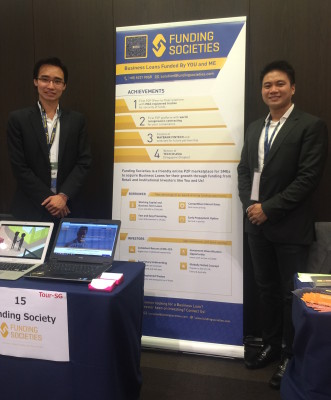This is a guest post by Kylie Greeff of whitelabelcrowd.fund
As one of the first countries in Asia to publish a regulatory regime, Malaysia is opening up to entrepreneurs, institutions and global operators to facilitate the ease of business credit through P2P lending. Ranked 18th on the World Banks’ Ease of Doing Business league tables, Malaysia is positioning itself as the conduit for global players to setup in Kuala Lumpur as gateway for serving P2P lending markets across Asia. Malaysia has one of the highest levels of financial inclusion in the world at 92 per cent and the country has taken advantage of mobile phones and online banking to expand access.
The recently published Securities Commissions (SC) of Malaysia’s rules on the operation of a Peer-to-Peer platform sets out the minimum requirements for the compliant operation of a Loan based crowdfunding platform in Malaysia.
Given the recent publication of the SC’s rules, we have undertaken a comparison of the regulatory requirements imposed on Malaysian P2P platforms with their UK counter parts. The comparison highlights a number of differences first both in the rules that must be followed to operative a platform as well as the minimum standards imposed on operators operating the platforms in Malaysia. Whilst the comparison identifies a number of differences between the two bodies of regulation, this is not unexpected give the differences in maturity of the two markets. P2P in its earliest form began in 2005 in the UK, with the UK regulator announcing its intention to regulate the sector in 2013. The UK’s early P2P regulations were very similar to those now produced by the SC.
The SC in their production of their regulations have clearly done their research into the rules implemented by many platforms and regulators around the world in helping them draft their first guidelines, and have arguably used the UK’s regulations as their closest reference. A strategy that appears to have been widely adopted in their regulation of other financial markets as well.
Below is a more detailed review of the UK and Malaysian regulation.
Capital Requirements
The first noticeable difference in the platform operator rules is the requirements by the SC for a platform to have a minimum paid-up capital of RM5 million (approx. £80,000). The UK regulatory body the Financial Conduct Authority (FCA) does not impose a minimum capital requirement for the start-up of a platform. The FCA instead imposes a capital adequacy Requirement (CAR) on platforms once they are trading and authorised by the regulator. A platform’s CAR requirement is based on the trading performance of the platform weighed against its loan book. The SC’s decision to incorporate a minimum capital level on start-up platforms could be seen as a possible reaction to the recent debate in the UK and USA about the possible implementation of Capital requirements on P2P platforms similar to those currently applicable to banks. This being said, the requirement of RM 5m is not prohibitively high and may not be seen by many market entrants as a particularly high barrier to entry, particularly by those supported by financial institutions familiar with far more prohibitive capital requirements.
Whilst the FCA does not have a start-up paid up capital requirement, recent feeling and expectation in the UK is that the FCA will potentially move to more onerous Capital Requirements similar to those imposed on many other financial institutions.
Investor Communication and Transparency
It is interesting to note that the SC has decided to enforce a specific requirement on P2P operators to use ‘an efficient and transparent risk scoring system’ and to ‘carry out a risk assessment on issuers’. The FCA imposes no such requirement on platforms, although the majority of platforms do incorporate a risk rating identification system for the benefit of lenders, the platforms do not openly publish their system or processes as these are closely guarded as valuable IP of the platforms. In the absence of a specific requirement to have an ‘efficient and clear risk scoring system’ the FCA would expect platforms to assess their market and client needs and ensure that they operate with in the FCA’s Principles for Business (PRIN), most notably in regard to risk modelling, Principles 5,7 and 9. It’s worth noting here that the SC operate similar principles in terms of Fund Management Companies, see Guidelines On Compliance Function For Fund Management Companies.
 The language used by the SC of ‘efficient and transparent’ is surprisingly vague and may be intentionally left as such to allow platforms the space to develop naturally allowing the SC room to review practices and later set what they deem to be appropriate transparent and efficient processes.
The language used by the SC of ‘efficient and transparent’ is surprisingly vague and may be intentionally left as such to allow platforms the space to develop naturally allowing the SC room to review practices and later set what they deem to be appropriate transparent and efficient processes.
In its list of Operator Obligations, the SC appears intent on ensuring that the platform operators acknowledge and respond to the need to maintain transparency between the investors and the Issuers and to make investors aware of the nature of their investment. This can be seen in rules 13.05 (d-f).
Interestingly rule 13.05 (d) requires operators to ‘carry out investor education programmes’. The FCA again poses no requirement on platforms to ‘educate’ their investors but it does impose standards of disclosure and business conduct in its Handbook. The FCA expects platforms to take measures to ensure that they are open and transparent about the nature of the investment products it offers and that information is clearly displayed and prominent for investors (COBS 2.2.1 and 2.2.2).
Carrying out educational programmes in the form of video’s and blog post as well as informative events are a good way to encourage a higher level of customer engagement, but also goes a long way to building the trust of investors in the platform. Rebuildingsociety.com has benefited greatly from publishing a number of blogs about its journey, the types of investment it offers, the internal processes it uses to ensure the efficient and safe operation of the platform. Transparency is greatly valued by both the investors and the regulators.
Anti-Money Laundering and Financial Crime Prevention
As expected, the SC has incorporated the need and responsibility of platforms to ensure that they carry out sufficient Anti Money Laundering (AML) and Financial Crime (FC) Prevention practices as part of their normal operating processes. AML and FC are increasingly sensitive areas. Whilst the SC’s Guidelines on Recognized Markets does not set out specific instructions and guidance on the expected processes and levels of due diligence required by platforms, platforms should look to the SC’s ‘Guidelines On Prevention Of Money Laundering And Terrorism Financing For Capital Market Intermediaries’ which was developed from Section 83 and section 66E of the Anti-Money Laundering and Anti-Terrorism Financing Act 2001 (AMLATFA) and section 377 of the Capital Markets and Services Act 2007 (CMSA). This document sets out the SC’s expectations of platforms in relation to AML and FC prevention.
The SC’s guidelines on AML and FC prevention are broadly similar to those of the FCA set out in SYSC 6.3, in that advocate a risk based, profiling approach to AML and FC prevention processes and require firms to incorporate enhanced Due Diligence practices where individuals are profiled to be higher risk. Continue reading




